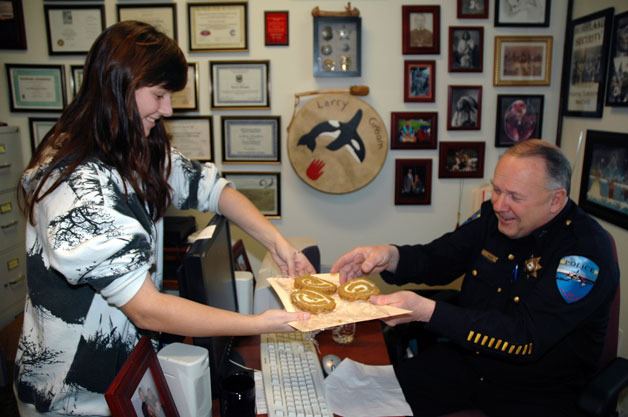TULALIP — Larry Groom isn’t sure how much time he has left, but the school resource officer for the Tulalip Police Department wants to keep doing what he’s doing until his time is up.
“I want to be the first cop in a walker,” laughed Groom, who was diagnosed a little more than a year ago with Amyotrophic Lateral Sclerosis, also known as “Lou Gehrig’s disease.” “I hope to work until I can’t.”
ALS is caused by the degeneration of motor neurons, the nerve cells in the central nervous system that control voluntary muscle movement. Groom praised the resiliency of Marysville firefighter Ray Hancock, who was diagnosed with ALS in April of last year, but he also noted that ALS affects each person in a unique way. While Hancock’s symptoms to date have ranged from weakness in his arms to the loss of manual dexterity, Groom’s symptoms have struck his throat and lungs.
“Those are usually the last symptoms to develop, but it attacks everyone differently,” Groom said. “I could have two to three years left, but there’s no guarantees. Some people pass on within six months to a year of being diagnosed, while others go on to live for as many as 15 years more. I’m here as long as the man upstairs wants me to be.”
Groom’s Christian faith has played a strong part not only in his outlook after being diagnosed, but also throughout his life as a police officer. This year will be his fourth as the Tulalip school resource officer, a role that serves as the capstone to a nearly 40-year career in law enforcement. Almost from the first, though, his primary motivation for working in the field has been working with kids.
“I’d wanted to be a police officer since high school, but when I went to Bible college, I was assigned to work with these kids on skid row,” Groom said. “I was a farm kid who fell in love with working with street kids. I told my pastor and he said that I could arrest them during the day and counsel them at night. Law enforcement is not just about arresting people, but also about making a difference in their lives.”
Although ALS has left Groom with a low, raspy voice, his approach to dealing with young people has always been soft-spoken. His office at the Marysville Secondary Campus is nearly blanketed with the certificates of achievement that he’s received over the years — he’s only found room on his walls for 45 of his 189 certificates — and students often stop by to show their appreciation to him.
“I always said I was going to try and put up as much of these certificates as I could,” said Groom, just as Marysville Arts and Technology High School student Mandy Klesick visited him to give him some pumpkin rolls shortly before the holiday break. “I wanted the kids to see what can be accomplished.”
Groom’s reduced lung capacity has left him more easily tired, but he always finds the energy to counsel young people. When students act out in aggressive or inappropriate ways, Groom prefers to soothe them rather than confront them, often by having them take a short walk to clear their heads before he takes the time to talk to them quietly one-on-one.
“Eight out of 10 times, if a student isn’t getting along with his teachers or his classmates, he’s dealing with problems at home or in his life,” Groom said. “If you try and go nose-to-nose with them, they’ll just bull their necks. Kids across the board, in Marysville and Tulalip alike, are dealing with issues like drugs, alcohol, violence and abuse at home, and taking care of their younger brothers and sisters for their parents.”
Groom’s interactions with these young people have earned him the rest of his office wall decorations, tokens from students ranging from drawings by Tulalip Tribal children to plaques made by Arts and Technology students.
“They treat me very well,” Groom said. “These kids make my day.”
Off the job, Groom spends his time in prayer and with his family. His own children are grown, and he’s taken steps to ensure that his wife will be able to go on after he’s gone.
“I’m prepared to leave when the time comes, because I know that Heaven is a great place,” Groom said. “In the meantime, I’ll wear a smile on my face to encourage others and help them get through their issues. I’m so thankful to the Tulalip people for giving my this opportunity. They really have treated me like family.”



